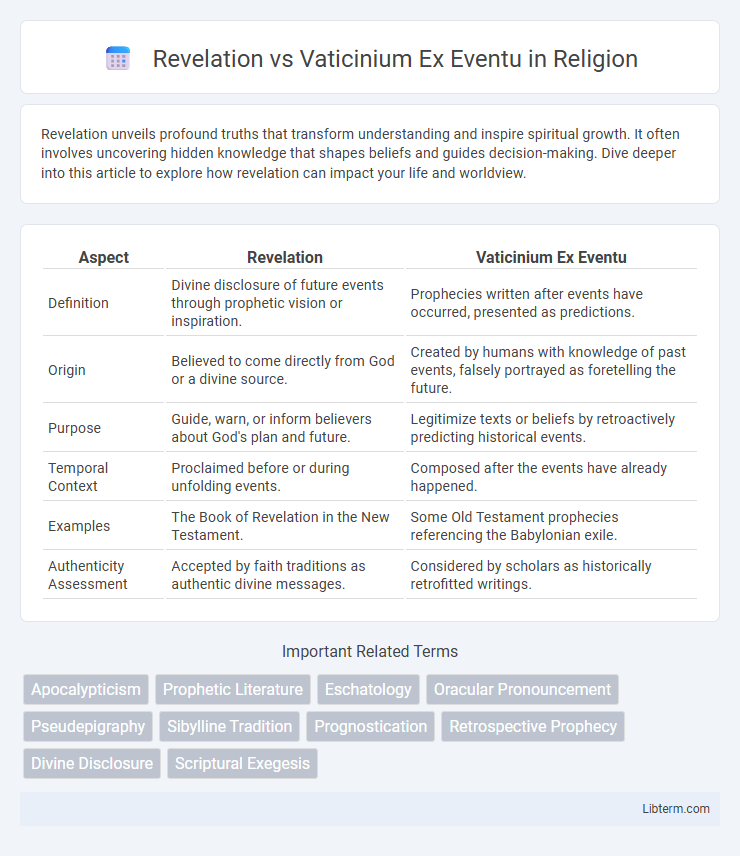Revelation unveils profound truths that transform understanding and inspire spiritual growth. It often involves uncovering hidden knowledge that shapes beliefs and guides decision-making. Dive deeper into this article to explore how revelation can impact your life and worldview.
Table of Comparison
| Aspect | Revelation | Vaticinium Ex Eventu |
|---|---|---|
| Definition | Divine disclosure of future events through prophetic vision or inspiration. | Prophecies written after events have occurred, presented as predictions. |
| Origin | Believed to come directly from God or a divine source. | Created by humans with knowledge of past events, falsely portrayed as foretelling the future. |
| Purpose | Guide, warn, or inform believers about God's plan and future. | Legitimize texts or beliefs by retroactively predicting historical events. |
| Temporal Context | Proclaimed before or during unfolding events. | Composed after the events have already happened. |
| Examples | The Book of Revelation in the New Testament. | Some Old Testament prophecies referencing the Babylonian exile. |
| Authenticity Assessment | Accepted by faith traditions as authentic divine messages. | Considered by scholars as historically retrofitted writings. |
Introduction: Defining Revelation and Vaticinium Ex Eventu
Revelation refers to the disclosure of divine or supernatural truths to humans, often found in religious texts as predictions or insights about the future. Vaticinium Ex Eventu, meaning "prophecy after the event," describes a literary technique where texts are written to appear as predictions but are actually composed after the events have occurred. Understanding these concepts is crucial for interpreting ancient scriptures and distinguishing authentic prophetic messages from retrospective narratives.
Historical Origins of Revelation
Revelation, rooted in ancient prophetic traditions, is understood as divine knowledge imparted directly to a prophet, originating prominently in Judaic scriptures with figures like Moses and Isaiah. Vaticinium Ex Eventu, or prophecy after the fact, emerged as a literary device in Hellenistic and Roman historiography, where texts purportedly foretell events that had already occurred. The historical origins of revelation reflect its role as a genuine claim of transcendent insight, contrasting with Vaticinium Ex Eventu's retrospective framework designed to legitimize or authenticate texts within their historical contexts.
The Concept of Vaticinium Ex Eventu Explained
Vaticinium Ex Eventu refers to prophecies written after the events they predict have already occurred, serving as retrospective confirmations rather than genuine forecasts. This concept is often contrasted with true revelation, which involves divine knowledge of future events before their occurrence. Scholars analyze textual evidence, historical context, and linguistic features to identify instances of Vaticinium Ex Eventu in religious and historical manuscripts.
Key Differences between Revelation and Vaticinium Ex Eventu
Revelation refers to divine or supernatural disclosure of knowledge, often considered prophetic and originating from a higher power, while Vaticinium Ex Eventu is a prophecy written after the events have already occurred, designed to appear predictive. The key difference lies in their temporal relationship to events: Revelation occurs before the event as true foresight, whereas Vaticinium Ex Eventu is a retrospective interpretation crafted post-event. Authentic Revelation typically holds theological authority, while Vaticinium Ex Eventu serves rhetorical or apologetic purposes, often used to validate beliefs through hindsight.
Biblical Examples of Genuine Revelation
Genuine revelation in the Bible often involves prophetic messages that accurately predict future events, such as Isaiah's foretelling of the coming Messiah and Daniel's vision of successive kingdoms in Daniel 7. These authentic revelations differ from vaticinium ex eventu, which are retroactive prophecies written after the events occurred, as seen in some historical psalms or prophetic books that reinterpret past events as predictions. The consistency and fulfillment of foretold events in genuine revelation serve as a key criterion distinguishing them from mere ex post facto compositions.
Evidence of Vaticinium Ex Eventu in Ancient Texts
Vaticinium Ex Eventu, or prophecy after the fact, is evidenced in ancient texts by historical inaccuracies or details reflecting events already known at the time of writing, rather than genuine foresight. Scholars identify anachronisms and contextually misplaced predictions in works like the Book of Revelation, suggesting these texts were composed post-event to lend authority or legitimacy. Such textual analyses emphasize how authors retroactively framed historical outcomes as divine revelation to influence contemporary audiences.
Theological Implications for Interpretation
The distinction between revelation and vaticinium ex eventu critically shapes theological interpretation by determining whether prophetic texts are viewed as divinely inspired foresight or retrospective constructions. Revelation implies authentic, inspired communication from a divine source, affirming doctrines of prophecy and divine omniscience central to many faith traditions. Vaticinium ex eventu challenges this by presenting prophecies as post-event writings, raising questions about scriptural authority, divine intervention, and the legitimacy of predictive claims within theological frameworks.
Scholarly Debates: Prophecy or Retrospective Prediction?
Scholarly debates surrounding Revelation often contrast it with the concept of vaticinium ex eventu, where texts are interpreted as retrospective predictions written after events have occurred. Experts analyze linguistic patterns, historical context, and thematic elements within Revelation to determine whether its prophecies genuinely forecast future events or reflect a theological reflection composed post facto. This ongoing discourse influences interpretations of apocalyptic literature, highlighting tensions between faith-based prophecy claims and critical historical methodologies.
Impact on Faith and Scriptural Authority
Revelation, understood as divine disclosure, forms the foundational basis for faith and the inherent authority of scripture, affirming its inspired and prophetic nature. In contrast, Vaticinium Ex Eventu, or prophecy after the fact, challenges the authenticity of scriptural predictions, potentially undermining believers' trust in the scripture's divine origin. The distinction significantly influences theological interpretations and the perceived legitimacy of religious teachings within Christian communities.
Conclusion: Understanding Prophecy in Context
Revelation in prophecy refers to knowledge revealed by a divine source, whereas Vaticinium Ex Eventu denotes predictions written after events have occurred to appear prophetic. Understanding prophecy requires analyzing historical context, authorship timing, and textual evidence to distinguish genuine divine revelation from retrospective fabrication. This critical approach enhances interpretation accuracy, preventing misapplication of prophetic texts.
Revelation Infographic

 libterm.com
libterm.com